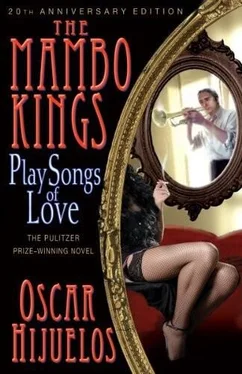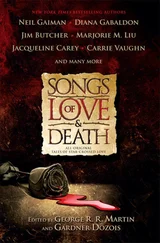Oscar Hijuelos
The Mambo Kings Play Songs of Love
. . with a flick of your wrist on your phonograph switch, the fiction of the rolling sea and a dance date on a Havana patio or in a smart supper club will become reality. Certainly, if you cannot spare the time to go to Havana or want to revive the memories of a previous trip, this music will make it all possible. .
FROM The Mambo Kings Play Songs of Love, TMP 1113, Orchestra Records, 1210 Lenox Avenue, New York, New York

IT WAS A SATURDAY AFTERNOON on La Salle Street, years and years ago when I was a little kid, and around three o’clock Mrs. Shannon, the heavy Irish woman in her perpetually soup-stained dress, opened her back window and shouted out into the courtyard, “Hey, Cesar, yoo-hoo, I think you’re on television, I swear it’s you!” When I heard the opening strains of the I Love Lucy show I got excited because I knew she was referring to an item of eternity, that episode in which my dead father and my Uncle Cesar had appeared, playing Ricky Ricardo’s singing cousins fresh off the farm in Oriente Province, Cuba, and north in New York for an engagement at Ricky’s nightclub, the Tropicana.
This was close enough to the truth about their real lives — they were musicians and songwriters who had left Havana for New York in 1949, the year they formed the Mambo Kings, an orchestra that packed clubs, dance halls, and theaters around the East Coast — and, excitement of excitements, they even made a fabled journey in a flamingo-pink bus out to Sweet’s Ballroom in San Francisco, playing on an all-star mambo night, a beautiful night of glory, beyond death, beyond pain, beyond all stillness.
Desi Arnaz had caught their act one night in a supper club on the West Side, and because they had perhaps already known each other from Havana or Oriente Province, where Arnaz, like the brothers, was born, it was natural that he ask them to sing on his show. He liked one of their songs in particular, a romantic bolero written by them, “Beautiful María of My Soul.”
Some months later (I don’t know how many, I wasn’t five years old yet) they began to rehearse for the immortal appearance of my father on this show. For me, my father’s gentle rapping on Ricky Ricardo’s door has always been a call from the beyond, as in Dracula films, or films of the walking dead, in which spirits ooze out from behind tombstones and through the cracked windows and rotted floors of gloomy antique halls: Lucille Ball, the lovely redheaded actress and comedienne who played Ricky’s wife, was housecleaning when she heard the rapping of my father’s knuckles against that door.
“I’m commmmmming,” in her singsong voice.
Standing in her entrance, two men in white silk suits and butterfly-looking lace bow ties, black instrument cases by their side and black-brimmed white hats in their hands — my father, Nestor Castillo, thin and broad-shouldered, and Uncle Cesar, thickset and immense.
My uncle: “Mrs. Ricardo? My name is Alfonso and this is my brother Manny…”
And her face lights up and she says, “Oh, yes, the fellows from Cuba. Ricky told me all about you.”
Then, just like that, they’re sitting on the couch when Ricky Ricardo walks in and says something like “Manny, Alfonso! Gee, it’s really swell that you fellas could make it up here from Havana for the show.”
That’s when my father smiled. The first time I saw a rerun of this, I could remember other things about him — his lifting me up, his smell of cologne, his patting my head, his handing me a dime, his touching my face, his whistling, his taking me and my little sister, Leticia, for a walk in the park, and so many other moments happening in my thoughts simultaneously that it was like watching something momentous, say the Resurrection, as if Christ had stepped out of his sepulcher, flooding the world with light — what we were taught in the local church with the big red doors — because my father was now newly alive and could take off his hat and sit down on the couch in Ricky’s living room, resting his black instrument case on his lap. He could play the trumpet, move his head, blink his eyes, nod, walk across the room, and say “Thank you” when offered a cup of coffee. For me, the room was suddenly bursting with a silvery radiance. And now I knew that we could see it again. Mrs. Shannon had called out into the courtyard alerting my uncle: I was already in his apartment.
With my heart racing, I turned on the big black-and-white television set in his living room and tried to wake him. My uncle had fallen asleep in the kitchen — having worked really late the night before, some job in a Bronx social club, singing and playing the horn with a pickup group of musicians. He was snoring, his shirt was open, a few buttons had popped out on his belly. Between the delicate-looking index and middle fingers of his right hand, a Chesterfield cigarette burning down to the filter, that hand still holding a half glass of rye whiskey, which he used to drink like crazy because in recent years he had been suffering from bad dreams, saw apparitions, felt cursed, and, despite all the women he took to bed, found his life of bachelorhood solitary and wearisome. But I didn’t know this at the time, I thought he was sleeping because he had worked so hard the night before, singing and playing the trumpet for seven or eight hours. I’m talking about a wedding party in a crowded, smoke-filled room (with bolted-shut fire doors), lasting from nine at night to four, five o’clock in the morning, the band playing one-, two-hour sets. I thought he just needed the rest. How could I have known that he would come home and, in the name of unwinding, throw back a glass of rye, then a second, and then a third, and so on, until he’d plant his elbow on the table and use it to steady his chin, as he couldn’t hold his head up otherwise. But that day I ran into the kitchen to wake him up so that he could see the episode, too, shaking him gently and tugging at his elbow, which was a mistake, because it was as if I had pulled loose the support columns of a five-hundred-year-old church: he simply fell over and crashed to the floor.
A commercial was running on the television, and so, as I knew I wouldn’t have much time, I began to slap his face, pull on his burning red-hot ears, tugging on them until he finally opened one eye. In the act of focusing he apparently did not recognize me, because he asked, “Nestor, what are you doing here?”
“It’s me, Uncle, it’s Eugenio.”
I said this in a really earnest tone of voice, just like that kid who hangs out with Spencer Tracy in the movie of The Old Man and the Sea, really believing in my uncle and clinging on to his every word in life, his every touch like nourishment from a realm of great beauty, far beyond me, his heart. I tugged at him again, and he opened his eyes. This time he recognized me.
He said, “You?”
“Yes, Uncle, get up! Please get up! You’re on television again. Come on.”
One thing I have to say about my Uncle Cesar, there was very little he wouldn’t do for me in those days, and so he nodded, tried to push himself off the floor, got to his knees, had trouble balancing, and then fell backwards. His head must have hurt: his face was a wince of pain. Then he seemed to be sleeping again. From the living room came the voice of Ricky’s wife, plotting as usual with her neighbor Ethel Mertz about how to get a part on Ricky’s show at the Tropicana, and I knew that the brothers had already been to the apartment — that’s when Mrs. Shannon had called out into the courtyard — that in about five more minutes my father and uncle would be standing on the stage of the Tropicana, ready to perform that song again. Ricky would take hold of the microphone and say, “Well, folks, and now I have a real treat for you. Ladies and gentlemen, Alfonso and Manny Reyes, let’s hear it!” And soon my father and uncle would be standing side by side, living, breathing beings, for all the world to see, harmonizing in a duet of that canción.
Читать дальше













